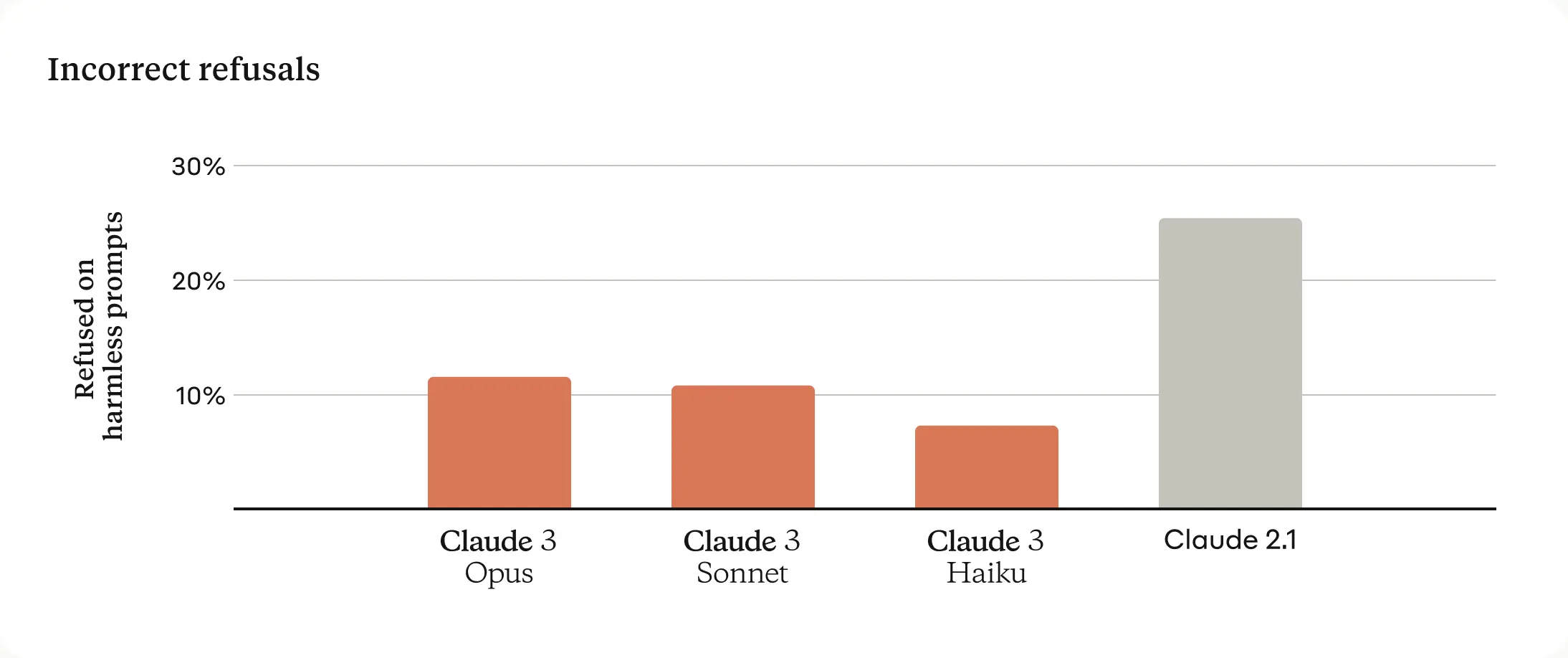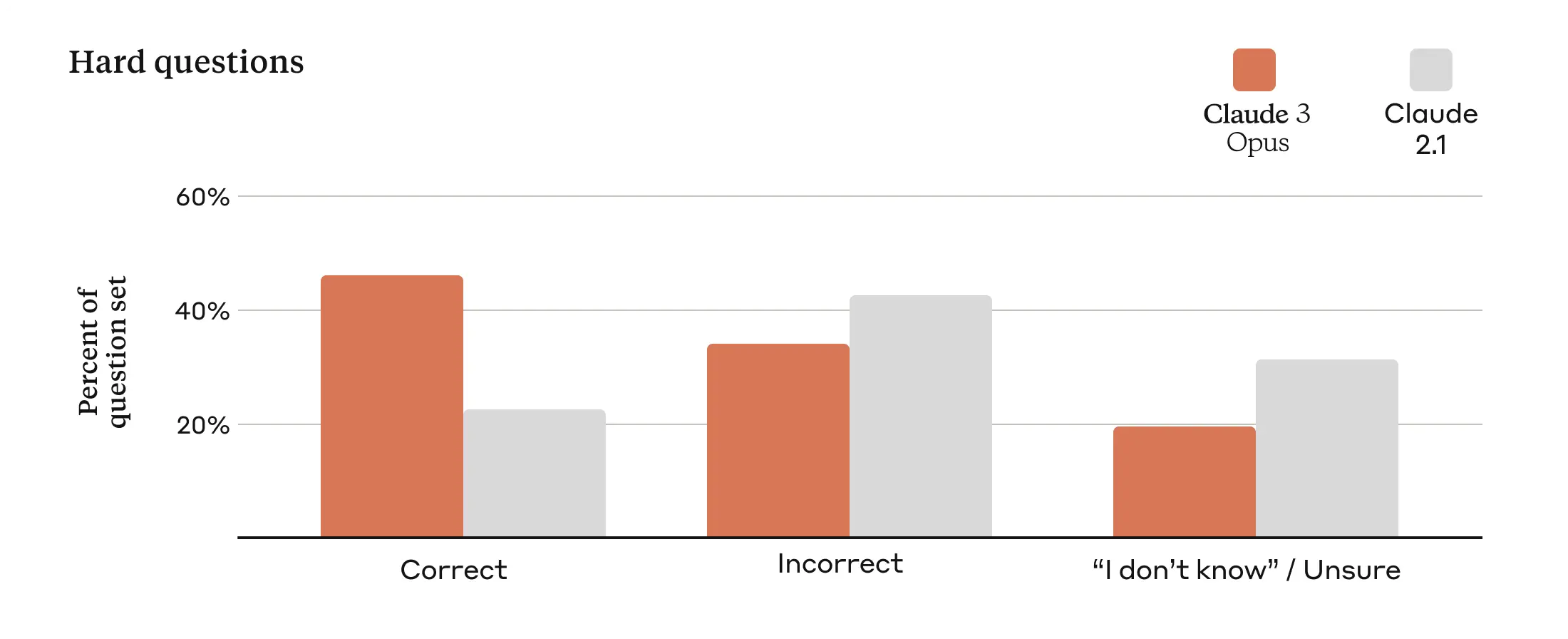Claude 3 Sonnet vs Opus vs Haiku vs GPT-4, a Complete Comparison
Published on

Introducing the Next Generation of Claude: Claude 3 Model Family
On March 4, 2024, a groundbreaking advancement in artificial intelligence was announced, marking a significant leap forward in the capabilities and applications of AI systems. The unveiling of the Claude 3 model family by Anthropic.com sets new benchmarks in the industry, offering unprecedented levels of intelligence, efficiency, and accessibility. This family comprises three state-of-the-art models, named Claude 3 Haiku, Claude 3 Sonnet, and Claude 3 Opus, each designed to cater to diverse needs and applications, from swift customer interactions to deep and complex analytical tasks.
You can test out Claude 3 features right Here
Article Summary
- Introduction of Claude 3: Anthropic.com announces the Claude 3 model family, consisting of Claude 3 Haiku, Sonnet, and Opus, each designed for different levels of cognitive tasks and applications.
- Increased Accuracy and Recall: Significant improvements in accuracy and recall capabilities, with Opus showing a twofold improvement in answering challenging questions.
- Responsible and Trustworthy AI: The development of Claude 3 models emphasizes responsible AI, addressing biases, and ensuring safety and transparency.
- Competitive Pricing Structure: Claude 3 introduces a tiered pricing model, making advanced AI accessible across a range of budgets and use cases.
- Superior Performance Compared to GPT-4: Claude 3 models, especially Opus, outperform GPT-4 in several fields.
The New Standard for Intelligence

The Claude 3 family introduces a new standard for artificial intelligence, with Opus, the most advanced model, leading the pack. It demonstrates superior performance across common evaluation benchmarks for AI systems, including areas such as undergraduate and graduate-level expert knowledge, basic mathematics, and more. This level of performance is indicative of near-human levels of comprehension and fluency in complex tasks, pushing the boundaries of what is considered possible with general intelligence.
Moreover, all Claude 3 models have shown remarkable capabilities in analysis and forecasting, nuanced content creation, code generation, and multilingual conversations, further solidifying their place at the forefront of AI innovation.
Speed and Efficiency Redefined

One of the most significant advancements with the Claude 3 models is their operational speed and efficiency. Haiku, the fastest model in the family, sets a new industry standard for speed and cost-effectiveness, capable of processing dense research papers in seconds. Sonnet, on the other hand, offers a balance of speed and intelligence, being twice as fast as its predecessors for the majority of workloads. Opus, while delivering similar speeds to previous models, offers a much higher level of intelligence, showcasing the progress in making advanced AI more accessible and efficient.
Enhanced Vision Capabilities
The Claude 3 models boast advanced vision capabilities, equaling or surpassing other leading models in the field. They can interpret a wide array of visual formats, making them particularly valuable for enterprises with extensive knowledge bases in non-textual formats.
A Step Forward in User Interaction
Significant improvements have been made in how the Claude 3 models interact with users. They are less likely to refuse to answer prompts, demonstrating a deeper understanding of requests and an ability to distinguish between harmful and harmless prompts more accurately. This marks a significant step forward in creating more engaging and useful AI-driven interactions.
Improved Accuracy and Recall
Accuracy is critical for businesses that rely on AI to serve their customers. The Claude 3 models have shown a remarkable improvement in accuracy, with Opus, in particular, demonstrating a twofold improvement on challenging open-ended questions. Furthermore, the family boasts enhanced recall capabilities, particularly evident in Claude 3 Opus's near-perfect performance on the Needle In A Haystack evaluation.

Responsible and Trustworthy Design
Anthropic.com has not only focused on advancing the technical capabilities of the Claude 3 models but has also placed a strong emphasis on their responsible and trustworthy design. Dedicated teams have been set up to mitigate a wide spectrum of risks, and efforts have been made to address biases and ensure the neutrality of the models. The Claude 3 family remains at AI Safety Level 2, indicating a continued commitment to safety and responsibility in AI development.
Ease of Use
The Claude 3 models are designed to be user-friendly, capable of following complex instructions and producing structured outputs in popular formats like JSON. This makes them particularly adept at adhering to brand voice and guidelines, facilitating the development of customer-facing experiences that users can trust.
Model Details and Availability
-
Claude 3 Opus is the flagship model, offering unparalleled intelligence and capability in handling complex tasks. It is designed for high-level task automation, research and development, and advanced strategy analysis.
-
Claude 3 Sonnet provides an ideal balance between intelligence and speed, engineered for enterprise workloads and large-scale AI deployments. It excels in data processing, sales, and time-saving tasks.
-
Claude 3 Haiku is the fastest and most compact model, designed for near-instant responsiveness in customer interactions, content moderation, and cost-saving tasks.
Opus and Sonnet are already available for use, with Haiku set to be released shortly. The launch of these models represents a significant milestone in AI development, offering smarter, faster, and safer solutions across a wide range of applications. As AI continues to evolve, the Claude 3 model family stands as a testament to the potential for positive societal outcomes through advanced technology. Anthropic.com invites users to explore the capabilities of Claude 3 and contribute to the ongoing evolution of this transformative technology.
Pricing, Performance Comparison, and Accessibility
The launch of the Claude 3 model family not only represents a significant technological advancement but also introduces a new paradigm in terms of pricing, performance, and accessibility. With the introduction of Claude 3 Haiku, Sonnet, and Opus, Anthropic.com has set forth a pricing strategy that aims to democratize access to cutting-edge AI technology, making it feasible for a wider range of users—from individual developers to large enterprises.
Transparent and Accessible Pricing
The pricing structure for the Claude 3 models is designed with the intent of making advanced AI capabilities accessible to a broad audience.
-
Claude 3 Opus, being the most sophisticated model, is priced at $15 per million tokens for input and $75 per million tokens for output. This model is geared towards users requiring the highest level of intelligence for complex tasks, such as task automation across APIs and databases, advanced research and development, and strategic analysis.
-
Claude 3 Sonnet offers a more affordable option, priced at $3 per million tokens for input and $15 per million tokens for output. Sonnet strikes the ideal balance between intelligence and speed, making it particularly suitable for enterprise workloads and large-scale AI deployments that require both high performance and cost-efficiency.
-
Claude 3 Haiku presents the most cost-effective solution, priced at $0.25 per million tokens for input and $1.25 per million tokens for output. This model is designed for applications that demand near-instant responsiveness, such as customer support interactions and content moderation.
These pricing tiers make it possible for users to select the model that best fits their specific needs and budget constraints, ensuring that advanced AI capabilities are within reach for a diverse range of applications.
Performance Benchmark: Claude 3 vs. GPT-4
When comparing Claude 3 to its predecessor and contemporaries such as GPT-4, the advancements in performance are notable. Claude 3's models, particularly Opus, have shown superior results in common AI evaluation benchmarks, demonstrating significant leaps in comprehension, reasoning, and fluency.
For instance, in benchmarks focused on expert-level knowledge and reasoning, Claude 3 Opus has outperformed GPT-4, especially in tasks requiring in-depth analysis and complex problem-solving. The enhancements in Claude 3 models are also evident in their improved accuracy and reduced rate of incorrect answers (or hallucinations), which are crucial for applications that depend on the reliability and trustworthiness of AI-generated responses.
Moreover, the Claude 3 models have achieved breakthroughs in processing visual information, a domain where they have matched or exceeded the capabilities of GPT-4, showcasing their ability to interpret and analyze a wide range of visual formats, including photos, charts, graphs, and technical diagrams.
How to Access Claude 3
Accessing the Claude 3 models is straightforward, ensuring that developers and organizations can easily integrate these advanced AI capabilities into their applications.
-
Claude.ai Platform: Both Opus and Sonnet models are currently available on the claude.ai platform. Developers can sign up on the platform and start using these models immediately, taking advantage of their advanced capabilities for a wide range of applications.
-
Claude API: The Claude API (opens in a new tab) provides a programmable interface to the Claude 3 models, making it possible for developers to incorporate these models into their own applications and services. The API is now generally available in 159 countries, offering global accessibility to the models.
-
Cloud Partnerships: Sonnet is also accessible through Amazon Bedrock and in private preview on Google Cloud’s Vertex AI Model Garden. This partnership ensures that users can leverage Claude 3's capabilities within their existing cloud infrastructure, facilitating ease of use and integration.
In summary, the Claude 3 model family not only pushes the boundaries of what is possible with artificial intelligence but does so in a manner that is accessible, affordable, and adaptable to a wide range of use cases. With its transparent pricing, superior performance compared to previous models like GPT-4, and multiple access points, Claude 3 is poised to revolutionize the way we interact with and leverage AI technology.
Conclusion
The introduction of the Claude 3 model family represents a pivotal moment in the evolution of artificial intelligence. Through Claude 3 Haiku, Sonnet, and Opus, Anthropic.com has not only elevated the benchmarks for AI capabilities but also addressed critical aspects of accessibility, pricing, and ethical AI development. This balance of advanced functionality, user-centric pricing, and responsible design makes the Claude 3 models a groundbreaking addition to the AI landscape, offering tools that are not just more intelligent but also more aligned with the needs and values of the society they serve. As we step into an era where AI's role is ever-expanding, the Claude 3 model family emerges as a beacon of innovation, inclusivity, and responsible advancement, promising to unlock new potentials across a myriad of domains.